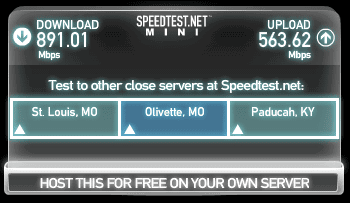I haven't been getting the throughput that I would like to be seeing on my WiFi setup so I thought that I would install some tools to see where the limits are coming from.
One of the nice things about Mac OS is that it's a member of the *nix family of Operating Systems so lots o' stuff is included... Like apache and php. I downloaded speedtest.net's mini app and did some testing of throughput. What I came up with was interesting.
This is testing internally on the machine itself:

I'm going to be doing some other testing throughout the night to see what I get and hope to figure something out soon.
Regards,
One of the nice things about Mac OS is that it's a member of the *nix family of Operating Systems so lots o' stuff is included... Like apache and php. I downloaded speedtest.net's mini app and did some testing of throughput. What I came up with was interesting.
This is testing internally on the machine itself:

I'm going to be doing some other testing throughout the night to see what I get and hope to figure something out soon.
Regards,

